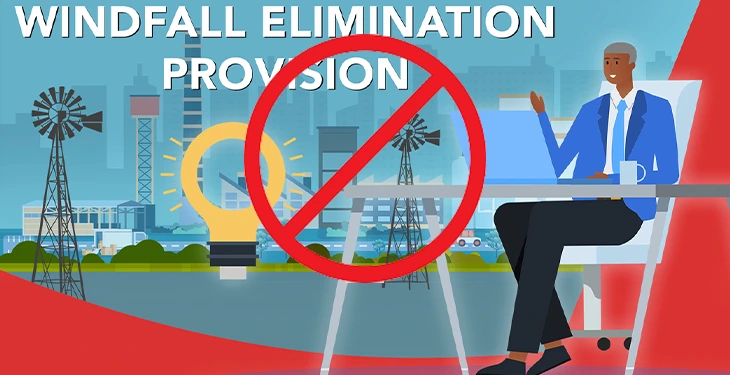windfall elimination provision repeal – The Social Security Fairness Act of 2023 has sparked significant interest among retirees and government employees. This proposed legislation aims to repeal the Windfall Elimination Provision (WEP) and the Government Pension Offset (GPO). These rules reduce Social Security benefits for individuals who receive pensions from jobs not covered by Social Security taxes.
In this article, we’ll explore what the Windfall Elimination Provision repeal means, how the legislative process works, and what could happen next.
What Is the Windfall Elimination Provision (WEP)?

Exclusive Windfall Elimination Provision Repeal – If you worked in such a job and also paid into Social Security through other employment, WEP could reduce your Social Security retirement or disability benefits.
For example:
- A teacher receiving a state pension might see reduced Social Security benefits.
- A public servant with a government pension could face similar cuts.
WEP primarily targets individuals with mixed earnings histories, ensuring they don’t receive higher-than-intended Social Security payouts.
What Is the Government Pension Offset (GPO)?

Exclusive Windfall Elimination Provision Repeal – The Government Pension Offset (GPO) affects spousal or survivor Social Security benefits for individuals with pensions from non-Social Security-covered jobs. If you qualify for Social Security benefits through a spouse but also receive a government pension, GPO may reduce your spousal or survivor benefits by up to two-thirds of your pension amount.
Example:
- If your government pension is $1,500 per month, your Social Security spousal benefit could be reduced by $1,000.
Why Repeal the Windfall Elimination Provision and GPO?
Critics argue that WEP and GPO unfairly penalize public servants, including teachers, firefighters, and law enforcement officers. They contend these rules reduce retirement income for individuals who paid into Social Security through other jobs or whose spouses qualified for benefits.
Repealing these provisions would:
- Increase retirement security for millions.
- Ensure equitable treatment for public employees.
- Simplify Social Security benefit calculations.
The Legislative Process: How Repeal Could Happen
The Social Security Fairness Act of 2023 aims to eliminate WEP and GPO. Here’s the legislative journey this bill must follow:
- Committee Introduction:
- The bill starts in a congressional committee. Lawmakers review, discuss, and potentially amend the proposal.
- Full House Vote:
- If the committee approves the bill, it proceeds to the House of Representatives for a vote.
- Senate Consideration:
- If the House passes the bill, it moves to the Senate, where lawmakers review, debate, and vote.
- Presidential Approval:
- If both chambers pass the bill, it goes to the President’s desk for approval or veto.
- Becomes Law:
- If the President signs the bill, it becomes law, repealing WEP and GPO.
Current Status and What’s Next

As of now, the Social Security Fairness Act has gained traction in Congress. Lawmakers have debated the bill in committees, moving it closer to a full House vote. If it passes the House and Senate, President Biden will decide its fate.
Potential Impact on Beneficiaries
Repealing WEP and GPO would boost Social Security benefits for millions of Americans. Key beneficiaries include:
- Retired teachers
- Firefighters and police officers
- Federal and state employees with government pensions
The bill’s passage could mean higher monthly Social Security payments and improved financial stability during retirement.
Challenges and Considerations

Despite widespread support, the bill faces challenges, including:
- Budget Concerns: Repealing WEP and GPO could increase Social Security’s financial obligations.
- Political Negotiations: Lawmakers might attach other legislative priorities, complicating the bill’s progress.
- Timing: With an election year approaching, Social Security reforms could become politically charged.
Conclusion
In conclusion, the Windfall Elimination Provision repeal offers hope for many retirees seeking fairer Social Security benefits. While the legislative process is complex, progress continues in Congress. Stay informed and prepared for potential changes that could impact your retirement future.
Read Also - Capital One Auto Finance 2024: The Powerful finance of the year
Advice for you :
Exclusive Windfall Elimination Provision Repeal 2024 - This article is just for information purpose. So if you want to make any kind of investment, please consult the experts yourself. Because if you make any kind of loss or profit, then we are not responsible for that. And to see such useful information at the right time, visit https://mymoneymates.com
Faq
What is the Windfall Elimination Provision repeal?
Exclusive Windfall Elimination Provision Repeal is a proposed legislative change aiming to eliminate Social Security benefit reductions caused by WEP and GPO.
Who benefits if the Windfall Elimination Provision is repealed?
Retirees with pensions from jobs not covered by Social Security would see increased benefits.
How soon would the changes take effect?
If the bill becomes law, changes would likely take effect based on the bill’s specified timeline.
Will past benefit reductions be reimbursed?
The current bill does not mention retroactive payments. Future benefits would be adjusted.
Why has the repeal taken so long?
Repealing WEP and GPO has faced political, budgetary, and procedural hurdles in Congress.

1 thought on “Exclusive Windfall Elimination Provision Repeal 2024: What’s Happening in Congress?”